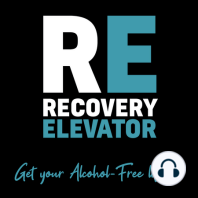47 min listen
RE 349: The Inner Voice
ratings:
Length:
57 minutes
Released:
Oct 25, 2021
Format:
Podcast episode
Description
Episode 349 – The Inner Voice. Today we have Tara. She is 37, from Canada, and took her last drink on February 20, 2019. Café RE’s annual on-line conference called Regionals starts 11/12-13/2021. This is a Café Re members only free event. This will include yoga, sound healing, meditation, and break outs rooms. Go to: www.recoveryelevator.com promo code: opportunity. Highlights from Paul Paul talks about his inner voice and how it failed him as he was trying to stack days in early sobriety. Inner narration can tell you in your own voice that it is okay to drink. It’s a subconscious voice. Paul advises that the first step is to be aware of the voice. Then you need to create distance between that voice and the first drink. Inner narration isn’t you, it’s a bundle of thoughts. Over time, you can let the space build between the thought and the drink so you can change your thinking. Gaze at the stars, look up and take a breath. Exact Nature exactnature.com Code: RE20 [10:37] Odette welcomes Tara Tara took her last drink February 20, 2019. She lives in Montreal and has learned to enjoy life – everything she does is for fun. She is a voice actress and podcaster. Tara described her relationship with alcohol as a product of self-loathing and rejecting herself. She took her first drink at 12. She was well adjusted and had her needs met at the time. She didn’t drink again until 15 when she was unhappy, depressed and feeling alienated. Alcohol filled a need to replace herself. A major shift happened when she was 18 and she took her drinking to another level – drinking in the morning and drinking alone. Alcohol became her primary relationship until she got sober. Alcohol was linked with everything she did. She had a lot of self-pity and thought the world was against her. She felt like she belonged at the bottom. Pain felt normal, like home. Tara went to 12 different inpatient rehabs. She would start to feel better and didn’t know how to deal with feeling better. Learning to care for herself emotionally was a big challenge. Even some basic tasks were a challenge. She escaped through relationships with men or would obsess about her looks to avoid facing herself. She took pride in not being a good person. She became a villain in her own story. She put her family and friends through a lot. She relapsed frequently and made false promises to herself and other people. She is amazed her family is still supporting her recovery. During her last stay in rehab, she was there for 12 days and had to leave because she had been so many times. Post rehab she went through the motions and went to meetings, got a sponsor, and did the things she was told to do without running the show. Her parents breathalyzed her which helped her become accountable. Early recovery was a challenge. Tara felt like a fraud and didn’t have confidence in her own ability not to relapse. Her brain was in a constant frenzy, and she had a partner who was struggling with addiction. She felt privileged to be able to do full time recovery for several months. She has learned to have a sense of humor about cravings or crazy thoughts. She focuses now on how she shows up in the world. She has expanded her spiritual practice and is learning to be consistent. Tara has learned to enjoy her own company. Her goal is to show up in her life in a way she can be proud of every day. Odette’s Summary What does bravery mean to you? You can choose to ride or not ride a roller-coaster. The brave choice is the one that rings true to you; the choice that aligns with your values, inner knowing and truth. Choosing to live an alcohol-free life is a huge act of bravery. Sobriety can be lonely, but bravery means standing up for yourself and advocating yourself, even when peers may pressure you to do otherwise. Sponsor: Exact Nature exactnature.com Code: RE20 Upcoming events, retreats, and courses: You can find more information ab
Released:
Oct 25, 2021
Format:
Podcast episode
Titles in the series (100)
005: You've got to be kidding me, he's an alcoholic also?: When I found out one of my brother's best friends is an alcoholic I was blown away; an a little upset that we hadn't connected years before so we could have been working together. Here are some of the resources that Elliot likes. Joe and... by Recovery Elevator ?
